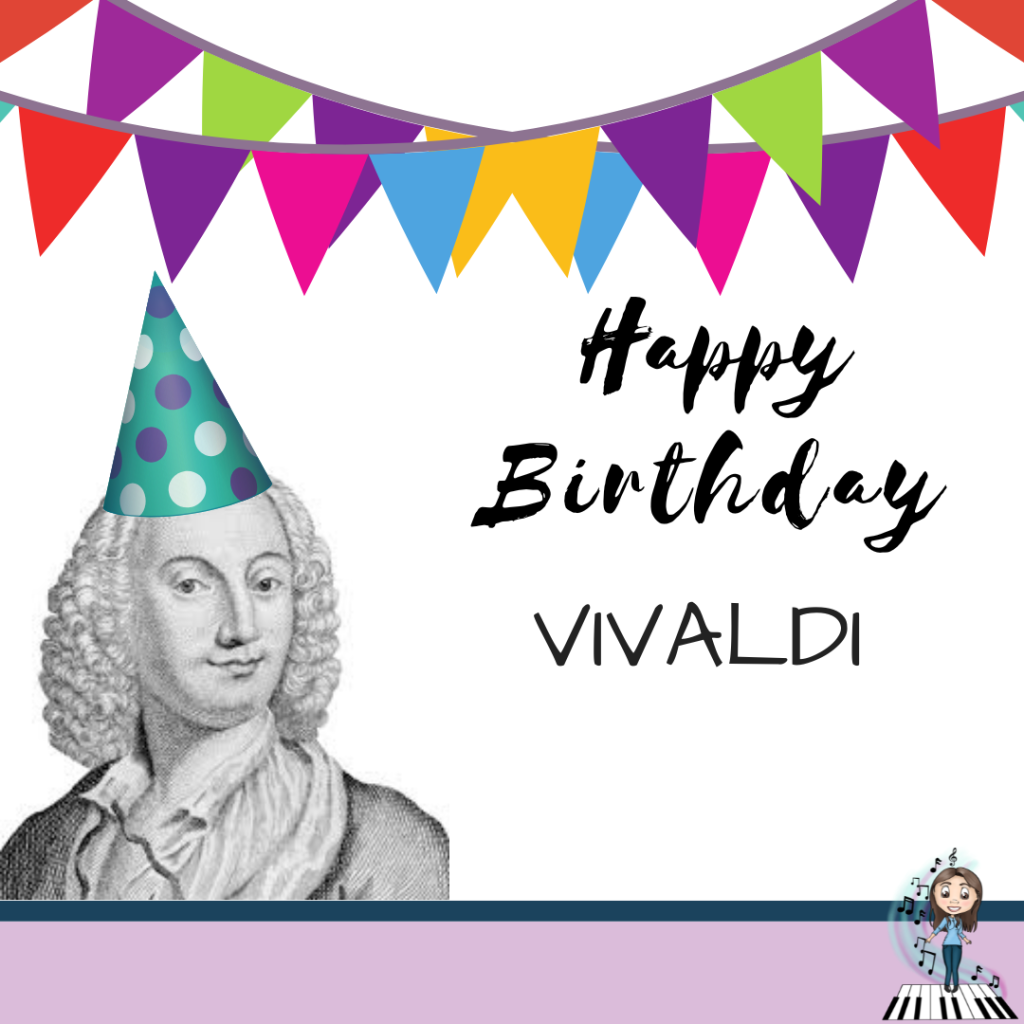
Happy Birthday Vivaldi!
The Venetian composer and virtuoso violinist Antonio Vivaldi was born on this day in 1678. He became a major figure in Baroque music, along with the likes of Johann Sebastian Bach and Georg Frideric Handel.
Vivaldi was born in Venice. He was baptised immediately after his birth by the attending midwife. The reason why has led to lots of speculation over the years – it is likely it was due either to his poor health, or to an earthquake which supposedly struck the city on the same day. However, it has been proven that there was no earthquake in Venice on the day of Vivaldi’s birth and that this rumour has no foundation.
From an early age, Antonio had problems with his health. He suffered from strettezza di petto (a “tightening of the chest”) which may have been asthma. This did not hamper his pursuit of musical activities, ashe learned to play the violin and began composing. It did, however, prevent him from playing wind instruments.
Vivaldi’s father, Giovanni, was a professinal violinist. He taught his son to play the violin and toured Venice with him. It is thought that Vivaldi began his violin lessons at an early age, judging by the level of musical skill and knowledge he possessed when he started working at the Ospedale della Pieta (more on this below).
In 1693 at the age of fifteen, Vivaldi began studying to become a priest. He was ordained in 1705 and was nicknamed il Prete Rosso (“the red priest”). This referred to his red hair, which was a family trait.
In 1703 Vivaldi became the master of violin at an orphanage called the Ospedale della Pieta. He soon became a successful music teacher, and over the next 30 years he composed most of his major works while working here.
The Ospedale was one of four similar institutions throughout Venice, whose purpose was to provide shelter and education to orphaned or abandoned children. The boys learned a trade, while the girls received a musical education. The most talented girls stayed on to become members of the Ospedale’s esteemed orchestra and choir.
Shortly after Vivaldi’s appointment, the orphans began to receive appreciation from abroad, too. Vivaldi wrote concertos and plenty of sacred vocal music – over 60 pieces – for them. In 1716 he was promoted to maestro de’ concerti (music director) and became responsible for all the musical activity of the institution.
In the mid 1710s, Vivaldi began composing for operas. At this time in 18th century Vienna, opera was the most popular form of musical entertainment. He wrote and produced several operas during this period, including L’incoronazione di Dario and Nerone fatto Cesare. Although only around 50 operas by Vivaldi have been discovered, it is thought that he could have composer up to about 90 altogether. His progressive style caused controversy with some more traditional musicians, and he was denounced in a pamphlet by fellow composer Benedetto Marcello.
In 1717 or 1718 Vivaldi was offered the prestigious post of Maestro di Cappella at the court of Prince Philip of Hesse-Darmstadt in Mantua, northwest Italy. It was after this that Vivaldi composed his most famous suite of works, the Four Seasons, four violin concertos based on the changing nature of the seasons of the year. The inspiration for the concertos was probably the countryside around Mantua. Each concerto is associated with a sonnet, describing scenes depicted in the music.
At the height of his career, Vivaldi received commissions from several members of European nobility and royalty. However, like many composers of the time, he suffered financial difficulties in his later years. Changing musical tastes meant that his compositions were no longer held in such high esteem as previously. He sold of large numbers of his manuscripts at rock-bottom prices in order to finance a move to Vienna. Soon after arriving in Vienna, Vivaldi became impoverished and died during the night of 27/28th July 1741 aged 63 years old.
He was buried in a simple grave in ground owned by the public hospital fund. The house where he lived in Vienna is no longer standing, but memorial plaques have been erected at both the site of the house and of his grave.
After his death, Vivaldi’s popularity dwindled. By the end of the Baroque period his works were largely unknown. In the 20th century the composer Fritz Kreisler wrote Concerto in C, in the Style of Vivaldi. This helped to revive interest in Vivaldi’s work. In 1926 a monastery discovered fourteen volumes of his work which were previously thought to have been lost in the Napoleonic Wars. The volumes contained 300 concertos, 19 operas and 100 vocal-instrumental works. Since World War II, Vivaldi’s compositions have enjoyed wide success.

